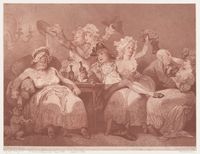
Plate 9: A youth playing the recorder while a man to the left holds up a music book; from 'Icones ad vivum expressae' after Giovanni Battista Piazzetta
Giovanni Cattini
An item at Metropolitan Museum of Art
Cattini engraved a set of 15 plates (frontispiece plus 14 numbered plates) after Piazzetta, entitling them: Icones ad vivum expressae. Most copies of the set are dated 1754 on the title page. A fine early set in the Mariette album of Piazzetta engravings in the Biblioteque Nationale is dated 1743. Moschini and Palluchini refer to a title page of 1763. Teodoro Viero reissued a reduced set of 8 plates plus title page in 1767. Several prints in the set were also copied by Johann Lorenz Haid of Augsburg (1702 - 1750), 1743-1750 and by Franz Xavier Jungwirth of Munich (1720-1790) in 1753 (see: George Knox, Piazzetta, exh. cata., National Gallery, 1983, no. 25; Maria Wiel, L'eredità di Piazzetta, 1996, no. 78, p. 50).
Drawings and Prints
An exhibit at Metropolitan Museum of Art
The Department’s vast collection of works on paper comprises approximately 21,000 drawings, 1.2 million prints, and 12,000 illustrated books created in Europe and the Americas from about 1400 to the present day. Since its foundation in 1916, the Department has been committed to collecting a wide range of works on paper, which includes both pieces that are incredibly rare and lauded for their aesthetic appeal, as well as material that is more popular, functional, and ephemeral. The broad scope of the department’s collecting encourages questions of connoisseurship as well as those pertaining to function and context, and demonstrates the vital role that prints, drawings, and illustrated books have played throughout history.




